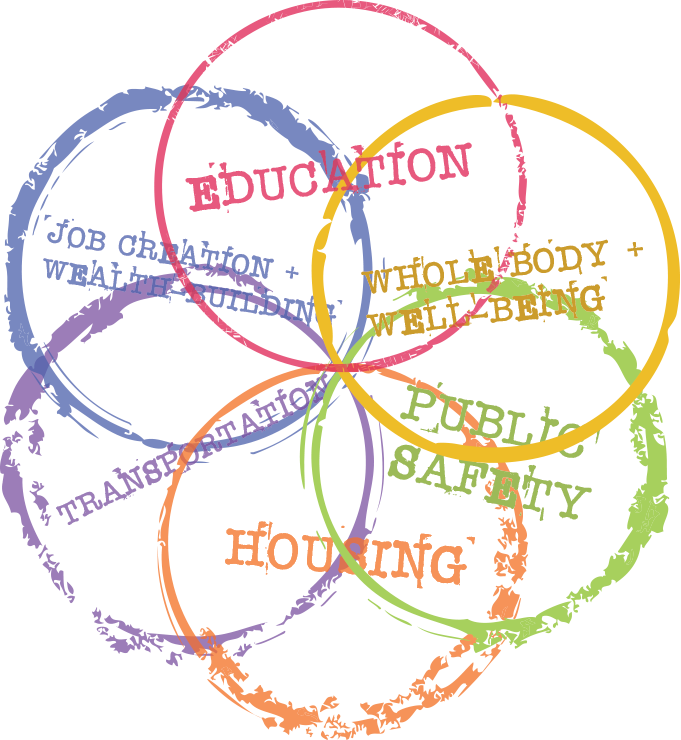Transportation Access is Essential for Social Justice
By Omari Al-Qadaffi, Amy C. Wentz, Adrienne Cole Johnson, and Tobias Estes
Published in the Richmond Times-Dispatch on November 4, 2017
Imagine not having reliable transportation, and constantly having to figure out how to get to work, how to transport your family, how to maintain extracurricular activities, and how to access well-rounded activities for your family.
Not only are you car-less, you also live on a side of town where public transportation routes are less frequent and limited. While taxi cabs and car services such as Uber and Lyft sound easy, when maneuvering on a daily basis they are quite costly. And to top it off, the majority of your social circle is in the same predicament, so catching a ride with someone is really not an option because most of your acquaintances do not drive.
For a moment, sit with these questions: What would you do? How would you handle transportation for yourself and your family? How would this affect your current life, personally and professionally?
If you took the time to react to the questions above, chances are that you felt a bit of stress and anxiety, just at the thought. And unfortunately, this is a regular consideration for many of our Richmond-area population — especially those residing in communities that are more polarized by a lower socio-economic status.
Many times, when people think of community justice, transportation isn’t the first thing that comes to mind; rather wealth, opportunity, and privilege distribution. Yet when you consider these characterizations and how limited access or simple lack of transportation plays out, we learn that transportation must be intimately woven into the community justice conversation.
***
According to Race Poverty and Environment, a journal for social and environmental justice, “lack of access to transportation is the number one deterrent to employment and community engagement across the country.”
Without adequate transportation, it is hard for individuals living in impoverished communities to find and maintain jobs outside of their immediate neighborhood. If employment is found outside of the neighborhood, it is often difficult to maintain. As we know, late arrivals and no-shows, due to any circumstance, are not often met with understanding in a professional work environment.
Locally, lack of adequate public transit clearly impacts education and family inclusion in our schools. Most of us are aware of the lack of accredited schools in our city’s’ most vulnerable communities, so when making the choice to apply and send your children to an accredited or specialty school outside of your zone, you must provide them with transportation to and from school, as well as extracurricular activities.
Transit-dependent citizens could be deterred from participating in school activities and parental events, thus lowering their student’s chances at successful education-related outcomes.
***
In general, experience and exposure are often limited when lack of transportation is present. While there are organizations and programs that push into communities to add support, there are so many points of exposure that are not experienced by our transit-dependent residents.
Equitable options and fair solutions for all are truly at the core of social justice — and while education, employment, exposure, and housing are often at the forefront, transportation is just as important and crucial to creating just communities for our most vulnerable and underserved residents.
Cities like New York, Philadelphia, and Washington provide their citizens with the opportunity to travel across town and surrounding counties to go after better-paying jobs, safe and affordable housing, and educational-enriching communities.
HUD data indicate that participants in voucher-based poverty deconcentration programs have a tendency to move into and stay longer in transit-rich neighborhoods. Thus, neighborhoods with diminished transit coverage become less desirable to transit-dependent and typically low-income residents.
***
As historical housing movements continue to occur, we are now experiencing what nationally acclaimed urbanist Alan Ehrenhalt describes as The Great Inversion. Simply put, American cities are changing, and the high concentrations of low-income transit-dependent residents near city centers, as a result of decades of racially motivated housing practices, are now experiencing lower levels of access to those suburban jobs.
So knowing this, what can you do?
Get involved. Richmond is beginning the work around transportation, and there are various entities seeking to solve our transportation challenges.
From the Richmond Regional Long-Range Transportation Plan to the GRTC’s aggressive approach in connecting the city, there are entities that need to hear your voice. When providing your valuable resident experience, remember all of your neighbors. Not just the West, but the East. Not just the North or the South. The more we consider one another in our planning, thinking, and strategy, the closer we will be to creating a united Richmond that we can all be proud to call home.
Transportation is truly a quintessential part of community justice and is a solid pillar of success. Let us keep this in mind as we go about the work of our city.
We invite you to join with a community of people concerned about transportation access in Richmond for film, discussion, and solution-oriented planning. Join us at the United Steel Workers of America Local 400 (184 E Belt Blvd, Suite 400, Richmond, 23224) on Sunday, Nov. 12 from 2:30 p.m. to 5:00 p.m. The gathering is free, family-friendly, and part of an ongoing effort to bring Richmonders together in support of more equitable personal and economic advancement for all.
